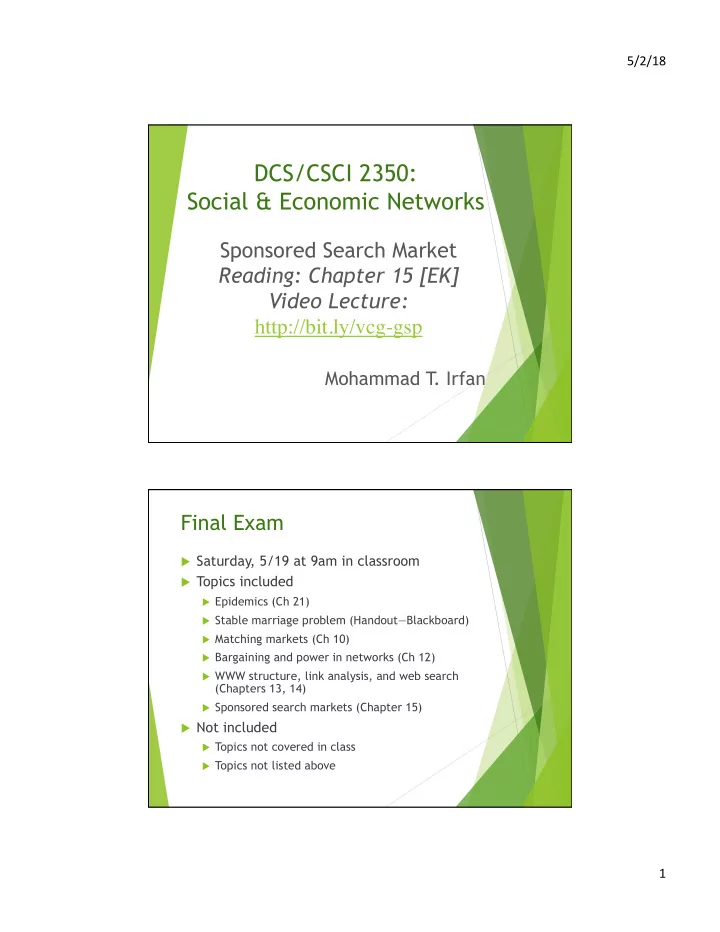

5/2/18 DCS/CSCI 2350: Social & Economic Networks Sponsored Search Market Reading: Chapter 15 [EK] Video Lecture: http://bit.ly/vcg-gsp Mohammad T . Irfan Final Exam u Saturday, 5/19 at 9am in classroom u Topics included u Epidemics (Ch 21) u Stable marriage problem (Handout—Blackboard) u Matching markets (Ch 10) u Bargaining and power in networks (Ch 12) u WWW structure, link analysis, and web search (Chapters 13, 14) u Sponsored search markets (Chapter 15) u Not included u Topics not covered in class u Topics not listed above 1
5/2/18 Questions u How does Google make money from web search? u Connection with auctions and matching markets Google's yearly revenue Source: statista.com 2
5/2/18 Google's yearly revenue just from ads Source: statista.com From CHI-2018 Conference Photo: Ishtiaque Ahmed 3
5/2/18 Agenda u Brief history u Conventions u Matching markets u Vickrey-Clarke-Groves (VCG) auction u Generalized second-price (GSP) auction Search market u Early days u Yahoo! negotiates deal with advertisers u Shows the ad a certain number of times u Effective? u Since year ~2000 u Keyword based advertising by Overture (bought out by Yahoo! in 2003 for $1.63B) u New market 4
5/2/18 Conventions 1. Pay per click u Advertisers pay Google on per click basis u How much? 2. Price setting by auction u Fixed price for keywords doesn't work. Why? u Main challenge in auction: multiple ad spots Preliminaries 1 u Search keyword (e.g., pizza) u Multiple ad slots Slot Ad 1 ? 2 ? 3 ? 5
5/2/18 Preliminaries 2 u Click-through-rate (CTR) of a slot u # of clicks/hr for that slot u Assumptions u Advertisers know CTR u CTR solely depends on the slot, not on the ad CTR Slot 10 1 5 2 2 3 Preliminaries 3 u Revenue/click u Advertisers revenue/click u Assumption u Solely depends on the advertiser, not on the slot u Private information Advertiser Revenue/Click x 10 y 5 z 2 6
5/2/18 Matching market u Will MCP work? u What will be the valuations of the advertisers? u CTR × revenue/click (Unit: $/hr) u Doesn't work because Google needs to know the advertisers' valuations First-price auction? u Did not work u Underbidding u Turbulent market u Second-price auction for multiple items? 7
5/2/18 Vickrey-Clarke-Groves (VCG) mechanism VCG mechanism u Alternative view of second-price auction u Outcome maximizes the social welfare u Winner is charged the "harm" he/she causes to the other bidders u How to calculate the harm caused by a bidder? u Calculate the increase in others' valuations in an alternative universe where that bidder is not there 8
5/2/18 VCG price VCG price: Each bidder pays the harm he/she causes to the other bidders (harm = total amount everyone would've been better off if that bidder were not there) Steps of VCG mechanism 1. Ask bidders to submit valuations (CTR × revenue/click) [valuations are independent and private, but truth-telling is dominant strategy] 2. Choose a socially optimal assignment (e.g., by MCP auction algorithm ignoring MCP prices) 3. Charge bidders their respective VCG price u Example 9
5/2/18 VCG pros and cons u Pros u Unique outcome u Maximizes social welfare u Bidders will submit their true valuations u Cons u Complex for bidders u Difficult to explain an outcome to bidders Difference: MCP vs. VCG price u MCP: posted price for each item (as in supermarket) u VCG: personalized price u VCG price for the same item is different for different bidder u Why? 10
5/2/18 (Superficially) Generalized Second-Price (GSP) Auction GSP auction 1. Each advertiser bids a single number: how much they'll pay per click 2. Google gives the i-th slot to the i-th highest bidder, who pays the bid of (i+1)-st highest bidder 11
5/2/18 Analysis u Varian (2007), Edelman, Ostrovsky, Schwartz (2007) u Game u Players: bidders or advertisers u Strategy: bid amount u Payoff: revenue − price paid u Nash equilibrium u Nobody has any incentive to change the bid unilaterally GSP pros and cons u Cons (for multiple items or slots) u Bidders may not be truthful (contrast w/ VCG) u May not optimize social welfare (contrast VCG) u Multiple Nash equilibrium possible (contrast VCG) u Single item: GSP = VCG = 2 nd price auction u Pros u Nash equilibrium always exists u One Nash eq maximizes social welfare u Maximizes Google's revenue? Maybe! 12
5/2/18 Examples u Bidders gain more by lying u Multiple Nash equilibria u Compare with VCG 13
Recommend
More recommend